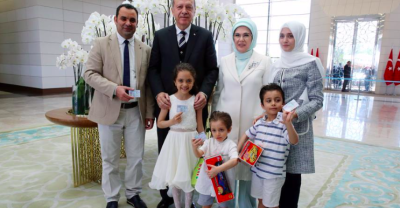Erdoğan’s Policies Isolated Turkish Youth and Failed to Raise a “Pious Generation”

All Global Research articles can be read in 51 languages by activating the “Translate Website” drop down menu on the top banner of our home page (Desktop version).
To receive Global Research’s Daily Newsletter (selected articles), click here.
Visit and follow us on Instagram at @globalresearch_crg and Twitter at @crglobalization. Feel free to repost and share widely Global Research articles.
***
The wager by Turkish President Recep Tayyip Erdoğan that his country could ride out inflation and currency shock with low rates has been fading fast because of the sustained rise of crude oil prices, which is not being helped by the war in Ukraine. Ankara is facing a severe economic crisis as the gas import bill alone is expected to jump to $40 billion this year against the net official foreign reserves of $18 billion. Economists are now ratcheting up forecasts of a massive current account deficit and an annual inflation rate as high as 70%. This is affecting how the youth of Turkey view their president despite Erdoğan’s promise to raise a “pious generation.”
Erdoğan’s popularity is waning, which might bear upon the prospects of his Justice and Development Party (AKP) returning to power in the next general election. Amidst the rising cost of living and intensifying shortages of essential commodities, Ankara has seen more than 60 strikes, factory occupations, protests and boycott calls in less than two months, according to the independent Labor Studies Group. Workers in a various industries, including textiles, transportation, mining and construction have joined protests against the unaffordable cost-of-living, posing a massive threat to Erdoğan’s re-election campaign as he has failed to meet the people’s expectations.
As per the call of the Turkish Medical Association (TTB), Turkey’s healthcare workers were on a two-day strike on March 14 and 15, which falls on “National Medicine Day.” The TTB accused the government of low wages and poor working conditions, and they demanded a minimum pay rise of 150% for healthcare workers.
The TTB said that working conditions for health workers and doctors in Turkey was very bad. At least 1,361 doctors left Turkey in the first 11 months of 2021, compared to 59 only in 2012. Long hours, low wages, violence toward healthcare staff, workplace bullying and poor working conditions have led many physicians to leave Turkey – thus fuelling an unprecedented brain drain.
Main opposition Republican People’s Party (CHP), while criticizing the Erdoğan administration, stated that the government made incompetent and insensitive appointments to the executive positions and directed violence against all healthcare workers, which became widespread.
Atilla Yesilada, an Istanbul-based economist at emerging-market analysis firm GlobalSource Partners, predicted a tough battle. He said to Bloomberg, “you can try to attract investments with cheap labor as a developing nation, but you can’t convince people to live with conditions worse than they are used to”.
Support for Erdoğan’s AKP has declined, despite claims from loyalists about continued people’s confidence in the president. A Metropoll study in February showed 72% of Turkish citizens are unhappy with living conditions. Backing for the ruling party has fallen to 25%, its core level of support, according to Ozer Sencar, head of the leading Turkish pollster Metropoll.
Meanwhile, a study published in Ankara by University Professor Ali Caglar and commissioned by the Konrad Adenauer Stiftung (KAS) think tank, stated that a significant majority (62.5%) of the ‘Generation Z’ (18-25 years age group) are frustrated with the Turkish government. Increasing economic difficulties, diminishing returns on their education and high level of restrictions on civilian rights are cited as reasons for their dissatisfaction. College debt and unemployment aggravated their discontentment. They found that the government’s policies are mostly irrelevant for them.
Bilal Erdoğan, the son of Recep Tayyip, remarked at the opening ceremony of the Turkey Youth Foundation in the northern province of Samsun that ordering Turkish coffee at Starbucks instead of a latte is better as it is symbolically connected with their faith, religion, identity and culture.
In the past, the ruling AKP could connect with the youth. However, in the digital environment, photos showing the luxurious lifestyle of the president, who lives in a literal palace worth $600 million, is frustrating Gen Z. Despite all government resources, the Erdoğan administration has failed to raise a “pious generation”, as the Turkish president himself promised, and the interests of the youth in religion is decreasing.
In the upcoming general election, this age group (Gen Z), accounting for 13 million people (15%) of the electorate, is decisive. Erdoğan’s much hyped moulding of young Turks into a so called “pious generation” of Turkish nationalists following his brand of Islamic political rule seems to be failing as a younger generation longs for what the president refuses to grant them. If the economic crisis in Turkey is not resolved, it will likely see the AKP ousted in the next election and replaced with the CHP, who historically are much friendlier to Washington and the West.
*
Note to readers: Please click the share buttons above or below. Follow us on Instagram, @globalresearch_crg and Twitter at @crglobalization. Feel free to repost and share widely Global Research articles.
Paul Antonopoulos is an independent geopolitical analyst.
Featured image is from aa.com.tr

